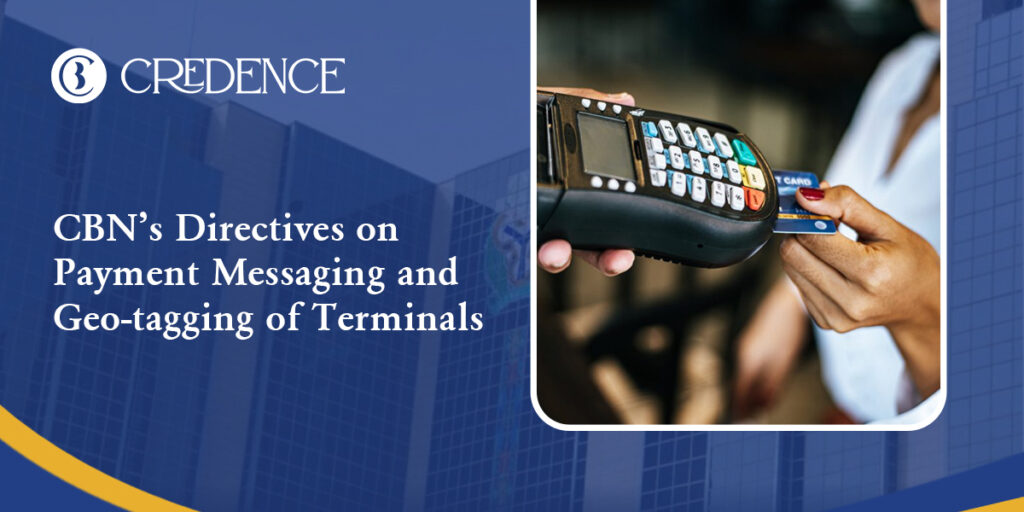Introduction
On August 25, 2025, the Central Bank of Nigeria (CBN), through its Payments System Supervision Department, issued a circular[1] to all licensed operators in the Nigerian payments ecosystem, including Deposit Money Banks, Microfinance Banks, Mobile Money Operators, and Switching and Processing Companies, and Payment Terminal Service Providers.
The circular introduces two primary directives: the migration to the ISO 20022 messaging standard and the mandatory geo-tagging of payment terminals.
This directive builds on earlier CBN circulars BKS/DIR/GEN/CIR/07/017, July 17,2020 and BKS/CRO/GEN/BNK/04/061, September 23, 2020, which first set out Nigeria’s roadmap for ISO 20022 adoption in alignment with Society for Worldwide Interbank Financial Telecommunication’s (“SWIFT”) global migration timelines.
This newsletter provides a concise analysis of the key provisions and their implications for operators.
Key Provisions
ISO 20022 Compliance:
- All payment transaction messages, whether domestic or international, must be formatted in ISO 20022 in line with CBN and SWIFT specifications.
- Institutions must ensure that all mandatory data elements, such as payer/payee identifiers, merchant/agent identifiers, and transaction metadata, are thoroughly and accurately populated.
- All in-scope institutions must complete migration and be fully compliant by October 2025.
- According to the July 2020 circular, SWIFT set November 2022 as the go-live date for ISO 20022 for FI to FI payments and reporting, with a three-year coexistence period for legacy MT messages before full decommissioning in November 2025.
- The 2020 directive required Nigerian financial institutions to commence awareness building in 2020, implement adoption solutions and conduct internal testing through 2020 to 2021, and complete network testing through 2022 ahead of the November 2022 go-live.[2]
- The September 2020 circular linked ISO 20022 migration with SWIFT’s Universal Payment Confirmations requirement, noting that ISO 20022 would be one of the supported channels for confirmation from 2022.
- The 2025 circular now serves as a reminder and reinforcement of these earlier directives, setting the final compliance deadline to align domestic operators with SWIFT’s global decommissioning of MT messages.
Mandatory Geo-tagging for Terminals:
- All payment terminals, both existing and new, must have native geo-location services enabled, using Double-Frequency GPS receivers for reliable tracking.
- Terminals must be registered with a Payment Terminal Service Aggregator (PTSA), providing accurate latitude/longitude coordinates of the business location.
- The National Central Switch Geolocation SDK must be implemented in the PoS Application libraries as part of the certification process, and the minimum OS requirement is Android 10.
- A “geofence” of 10 meters outside the registered business location is permitted for merchant activity.
- Geo-location data must be captured at the start of a transaction and included in the message payload as a mandatory field.
- Existing terminals must be geo-tagged within 60 days of the circular’s issuance, while new terminals must be geo-tagged before certification and activation.
- The CBN will begin compliance validation exercises from October 20, 2025.
Implications
- These directives reflect a progressive shift in Nigeria’s payments regulatory framework. The transition to ISO 20022 aligns domestic standards with international best practices, enhancing interoperability and data richness in financial transactions.
- By referencing the 2020 timelines, the CBN has provided financial institutions with a five-year runway to prepare. The 2025 deadline is therefore not a new requirement but the culmination of a phased migration process consistent with SWIFT’s global roadmap.
Conclusion
The CBN’s new circular represents a progressive shift in Nigeria’s payments regulatory landscape. The directives are designed to enhance transaction integrity, curb fraud, and ensure standardized data quality across the payments system. For all licensed operators, compliance with these new regulations is not optional. The CBN has been granted broader tools to enforce these laws in the interest of market integrity and consumer protection by virtue of the CBN Act and the Banks and Other Financial Institutions Act (BOFIA) 2020.
For further clarification or assistance regarding compliance with new regulations or any related legal matters, you can contact us via email – lawyers@credence-law.com
[1] PSS/DIR/PUB/CIR/001/001.
[2] BKS/DIR/GEN/CIR/07/017, July 17,2020

